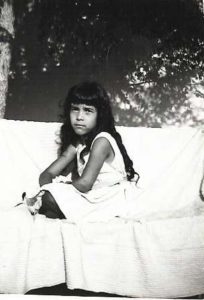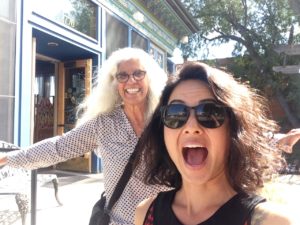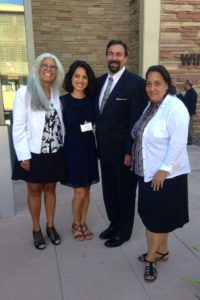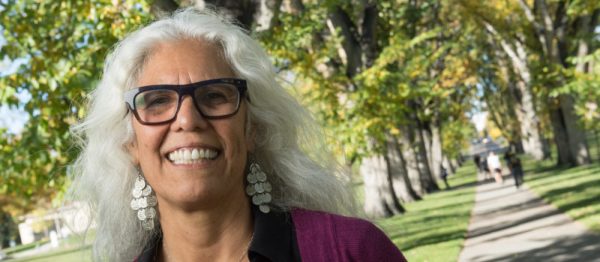As appearing in SOURCE
When Irene Vernon was a baby, her mother looked out the kitchen window at her husband and sons working in the field and said to herself that she didn’t want her family to spend the rest of their lives doing that.
Her father was a migrant worker, and that story of her mom wanting a better life was one Vernon never forgot. The family moved from Little Rock, Arkansas, to San Bernardino, California, and when she grew up, Vernon became dedicated to improving the lot of disadvantaged and underserved populations. For more than two decades, Colorado State University has been the beneficiary of her efforts.
Vernon, head of CSU’s Department of Ethnic Studies, is retiring this month after a career that included shepherding ethnic studies from a center to a department and elevating the women’s studies program. Her record of service to underrepresented groups also has made an enduring mark on the campus.
A winding road
Vernon says the work ethic she learned from her parents helped her climb career ladders. Her first job after high school was as a roller-skating carhop at A&W, followed by a short-lived banking career. On the advice of a former boyfriend, Vernon became the first in her family to attend college, focusing on American Indian studies, as it was called then. At one point she thought about becoming an eye surgeon, an idea she shared with her college counselor just before graduation.
“The guy looked at me like I was crazy,” Vernon says with a laugh. “He said I should have done pre-med.”
Her status as a woman of color fueled a passion for activism in the 1970s and a job in the American Indian Lawyer Training Program, followed by two years of law school. A career turning point came when, working at a Santa Barbara law firm, she snapped when her boss asked her to fetch a file.
“Are your legs broken?” she asked. He responded with three points: “You’re a bad secretary. You don’t give me respect. And you’re too smart for this job.”
“That was a pivotal moment for me,” Vernon recalls. “He said, ‘Go do something with your life.’”
Teaching career
One of her mentors, prominent Native American author Gerald Vizenor, suggested that she’d make a good teacher. That is the path she has pursued for the past 22 years, after earning a master’s degree in history from the University of New Mexico in 1992 and a Ph.D. in ethnic studies from the University of California, Berkeley, in 1994.
During Vernon’s first visit to CSU, where her husband had gotten a job, staff at the Native American Cultural Center suggested she talk to College of Liberal Arts Dean Robert Hoffert about a possible position. Hoffert would later name her the director of the Center for Applied Studies in American Ethnicity, the center that Vernon helped transform into the Department of Ethnic Studies.
“I would not be here in this position without Bob Hoffert,” Vernon says. “Nothing ever gets done alone. I’ve had great help from friends and colleagues.”
“Working with Irene was like embarking on one adventure after another — always a challenge, never relaxed and never a shortcut,” Hoffert remembers. “The journeys were always purposeful, robust, dramatic, relentless and decent. They left me with a gratifying sense of pleasure, a sense of exhaustion, and a sense that the trip we shared made things better than they were before we embarked.”
Another mentor
In addition to Hoffert, Vernon says University Distinguished Teaching Scholar and former English department head Pattie Cowell has served as one of her biggest mentors. Cowell was the one who initially hired Vernon as a faculty member in 1994.
“I’d tell Pattie, ‘I want to be you,’” Vernon recalls with a laugh. “And she’d say, ‘You need to be yourself.’ Even after I became a department chair, she was my go-to.”
“It was Irene’s leadership that created the Ethnic Studies Department,” Cowell says. “She worked tirelessly through the curriculum and staffing issues — and yes, the politics — that were critical to moving the Center for Applied Studies in American Ethnicity to department status.”
to moving the Center for Applied Studies in American Ethnicity to department status.”
Once the financial support was in place, the center officially became the Ethnic Studies Department in 2008.
“I think we viewed it as a miracle,” she says of the move. “I praise our faculty for hanging in there. Our faculty have been fabulous.”
Research focus
Vernon also made her mark in research, following Vizenor’s advice again by focusing on HIV/AIDS in Native communities, then Native American and Native Hawaiian transgender populations.
“She has been instrumental in developing an interdisciplinary public health curriculum at CSU,” Cowell explains. “Her research on AIDS on Indian reservations and on transgender indigenous individuals has contributed to the field, but her grant-writing and administrative acumen were critical to program development as well.”
“As department chair, Irene has modeled the tripartite role of faculty — teaching, research and service,” Cowell adds. “She has been developing new courses since she joined the CSU faculty, first in the English Department and then in Ethnic Studies. She has steadily pursued research and publication in public health, indigenous rights — especially rights to religious expression — and literature. And she has contributed to so many service projects and committees that I can’t possibly enumerate them.”
After gaining department status, and in large part due to Vernon, Ethnic Studies took the women’s studies program under its wing in 2011, when the program was having trouble finding an academic home outside of the advocacy offices. It now lives in the department’s Center for Women’s Studies and Gender Research and will begin offering a major in women’s studies in 2017.
Recent highlights
Looking back, Vernon says the two biggest highlights in this final phase of her career have been chairing the Standing Committee on the Status of Women Faculty and working with CSU President Tony Frank.
“I have met some incredible women around campus,” she says. “They are bright and brilliant, and they care about the cause. The standing committee provides a safe space for these women, and an opportunity to talk at a higher level of understanding.”
Among the standing committee’s accomplishments, Vernon cites the creation of a faculty ombuds position, improvements to the parental leave policy, ongoing enhancements to the campus policy on bullying, the recent salary equity project for tenured women faculty, and a current project examining the perceptions and experiences of women faculty.
As for working with Frank, Vernon lauds his values.
“I’ve appreciated seeing, up close, the difficulty of his job,” she says. “It’s 100 times what I have to deal with — making choices that please everybody is difficult. But I’ve admired his commitment to making this a better place for women.”
“Irene Vernon has been a transformative force at Colorado State University through her academic leadership, her research and teaching, and her passionate advocacy,” Frank said. “We’ve worked together on countless issues and challenges over the years, and I am personally grateful both for outstanding leadership as the founding chair of our Standing Committee on the Status of Women Faculty – and for her friendship and counsel. Her legacy and impact at CSU is extraordinary.”
Retirement
Her plans for retirement? “Exercising more and sleeping better,” Vernon says. She and her husband are building a house on Whidbey Island off the coast of Washington state, where she plans to do give back even more by doing volunteer work in her new community.
“My career has been driven by my own values around social justice, equity, fairness and access to education,” Vernon concludes, adding that she couldn’t have accomplished any of it without the support of her family.
“Irene is a steadfast advocate for faculty, students and staff, to ensure that the campus community works towards becoming an equitable environment,” says Arlene Nededog, director of inclusion for the College of Natural Sciences. “She doesn’t hesitate to speak up, question and problem-solve for issues facing women and people of color.”
“She’s a thoughtful and insightful leader, a charismatic activist, a compassionate human being and an honest and supportive co-worker,” Pamela Jumper Thurman and Barbara Plested wrote in a statement sent on behalf of the staff of the Commitment to Action for 7th Generation Awareness & Education: HIV/AIDS Prevention Project. “Her presence will be greatly missed, but her impact will remain and continue to inspire those of us who were fortunate enough to work with her and learn from her.”
Vernon deflects the praise.
“I don’t like a lot of accolades,” she says, “because I feel that I don’t do things alone, there’s always a team involved. You need other people.”

